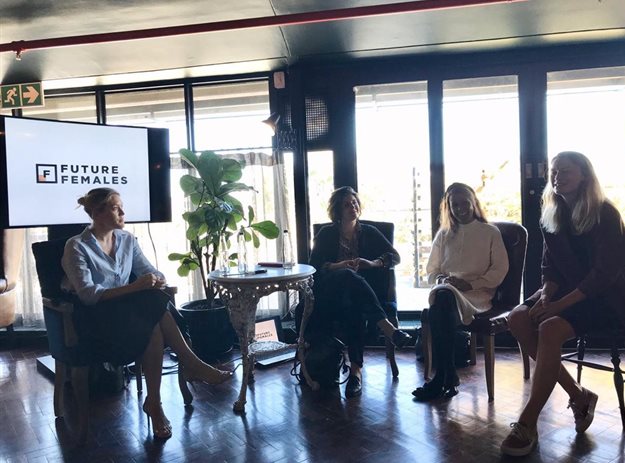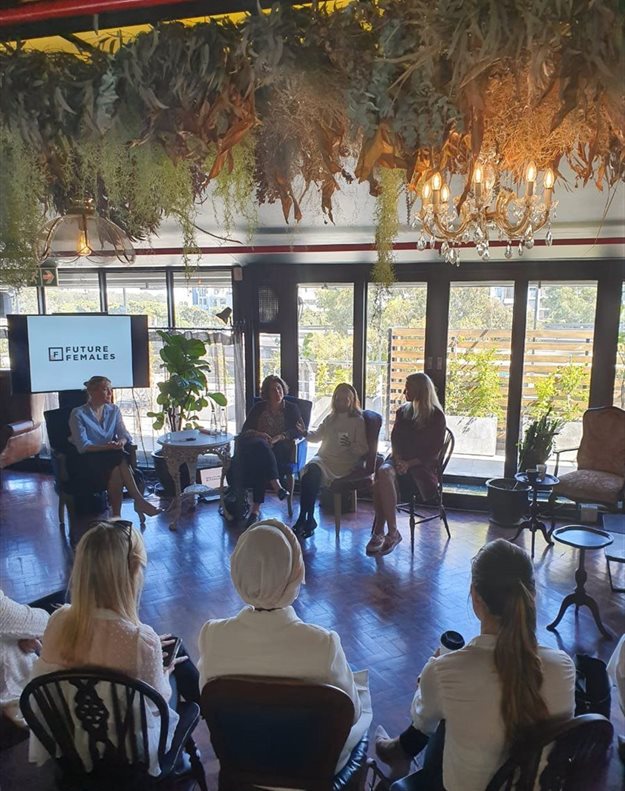






Future Females is a movement that exists to increase the number of and success of female entrepreneurs and intrapreneurs.
As a result, we mingled on the roof of the ICIC Old Foundry building in the middle of Cape Town Startup Week 2019, and networked up a storm over a delicious breakfast before the morning’s ‘informal chat’ kicked off, with some of the most inspiring local entrepreneurial females of 2019.

Future Females’ core member and head of digital marketing for African Bush Camps, Cordula Pfluegl shared that globally, only 2% of VC funding went to female-founded companies, and the number rose to just 2.2% in 2018.
SA's startup sector is so hot that Ventureburn editor Stephen Timm had to don sunglasses in a presentation at #CTSUW yesterday (heavychef ) https://t.co/3QKuaAxxl9
— Alexah Africa (@AlexahAfrica) December 6, 2019
Pandor began SweepSouth in 2014 with her husband as co-founder and lists a business highlight from the past year as realising what funding allows your business to do and how it enables longer-term thinking as the business has proven itself in the venture capital space.
Pandor shared that they’re definitely eyeing international expansion as well as new verticals like SweepSouth Connect, which offers work opportunities to tradesmen like plumbers and electricians.
She’s thinking bigger and broader about the business than previously, such as in also selling cleaning products through their shop, and will be launching in Kenya soon.
Pichulik started her business around the same time as Pandor, as a fashion and jewellery brand inspired by the African design space. They’ve successfully managed to scale and now export to international countries.
Pfluegl said it’s good to showcase the highlight reel, but we also want to know about the biggest business challenge.
While they started off as a family, Pichulik had to formalise their way of work as they scaled rapidly.
She said it’s exciting to be taking orders from some of the world’s largest premium retailers like Bloomingdales, but the big guys’ payment terms are often a challenge.
She shared that sometimes it’s so exciting to realise there is an appetite for your offering that you don’t feel you have the agency to choose where you want to sell, but it’s empowering to do so.

Pichulik also listed the ‘hairy and scary’ exciting challenge of having started as a singular CEO who for whom having an executive decision-making session often meant thrashing out the idea with herself and having bootstrapped the business, to recently taking on a co-CEO.
Pichulik added that there’s great beauty in restraint and solidifying. In the social media age, we want quick solutions, to be that entrepreneur jetting around in just six months, we get deeply depressed if it doesn’t happen.
Luckhoff, a speaker at the first Future Females event, spoke of her latest entrepreneurial journey, in offering a cloud-based AI solution for retailers called 20Fifty, which helps companies migrate to the cloud and query their internal databases.
All the technology exists, so it’s a case of rapidly prototyping and making it possible to scale.
She provided a personal take on her first year of business with this, her fourth business as well as the overlap of her business lowlight: She also ran recommendation-based music-streaming service NicheStreem, which she had to shut down.
Everyone tells you how to start a business, no one tells you how to walk away, especially when it’s been very successful.Luckhoff said Nichestreem was a successful business that got bitten by slow payments, despite the committed team and users.
Luckhoff says she often has to explain to her parents what she does, especially as her current offerings are cloud-based solutions, which circles back to her curiosity.
As a weathered founder now back in the startup space, Luckhoff is constantly looking to upskill herself.
She’s completed courses through MIT and loves working in the cloud as it means your startup doesn’t have to deal with IP issues or pay to put bums on seats in the early days to get things done, which means you can put that investment where it matters most.
Pfluegl asked about specific African challenges in the first three years of running a business. Depending on the business, the upside could be lack of competition and increased room to grow, but a challenge is likely access to great talent, like an understanding of machine-learning.
The team is the most important aspect of any business, no matter how big it grows. You need people who buy into the philosophy, not just the free coffee.There’s a lot of hype on how to start things, especially here in SA where entrepreneurship is seen as the answer to the unemployment challenge, but it can be a lonely space.
While the business world’s 30- to 60-day payment terms make it difficult for your business to thrive, if not survive, it’s staffing issues that will get to you more than anything.
Non-entrepreneurs often don’t realise that when you run a business, it’s essentially a mirror to your own life, with a spillover of your insecurities and fears.After a particularly bad day, Luckhoff’s now-husband told her “They can’t take away your belly button or your birthday.”

You need to be self-reflective and if you’re a leader in any capacity, all three speakers recommend that you see both a therapist and a business coach to help you unpack and guide you through that self-development work.
This is essentially an intricate feedback loop, as the buck stops with you and as the business owner, other people’s lives are now in your hands.
Pichulik reminds us that everyone’s journey is their own, but you need to be willing to show up in that space.
On working with her husband, Pandor says she’s always been brutally honest on the journey as it doesn’t help anyone to sugar-coat it. Luckily, Pandor says her husband has a complementary skill set to her own and their personalities work well together.
Before starting SweepSouth, Pandor was a scientist and management consultant, so she went from talking to cells in a Petri dish to addressing the business principles that are drilled into you to starting from scratch.
Pandor says it can be difficult to separate your partner from the professional person, but it’s about being able to respect someone for their professional work and where their talents lie, it’s about knowing someone completely.
It would be difficult to justify the amount of time she has dedicated to SweepSouth if her business partner wasn’t also her life partner.
She says it helps to have someone who knows exactly what you’re going through and can help you pull herself together and keep on going when things get tough, as we all have tough days.
Pfluegl also opened the floor to questions from the audience, who were appreciative of the honesty openness of the morning’s speakers as there’s "a lot of bullshitting" about the entrepreneurial process.
The hardest thing is admitting you need help and understanding that it’s OK not to be OK all the time. That’s why you need to be able to have an honest conversation with someone, where you’re not judged and your thinking can be turned on its head.
In doing so, you can “turn the rug into a floating carpet when it’s pulled out from under you.”
Pandor echoed her earlier comment, that balancing the work required to get a startup off the ground with the personal is another challenge as it’s hard on your life partner.
Pichulik said to be conscious of building a business that suits your nature. Do you need routine or can you drop everything when a new challenge arises? What hours do you do your best work? Often, we build the boat but it doesn’t serve our personal good.
It’s OK to say no. It’s easy to get sucked into saying ‘yes’ to every opportunity that comes along, as you feel a responsibility to the media and your investors, but that won’t serve you well.
Luckhoff said that word-of-mouth marketing works well for her business, as there is security in obscurity and not revealing exactly how you do what you do on your ‘about us’ page or elsewhere in the media.
She says to always make sure a business deal is not just being offered because you are female. She adds that women who play up that aspect do a disservice to others. This doesn’t mean you can’t be feminine in business, but don’t use that to curry favour.
Answering the question everyone wants to know: When to decide to drop your main job and go with your side hustle full time, Pandor and Pichulik said to be cautious as there are so many dynamics that play into this decision.
Having a salary is more addictive than sugar, so set yourself a milestone goal, as you need to plan adequately before taking the plunge.While you don’t necessarily need three years’ salary saved up before you get started, you do need to keep your personal expenses low. Don’t up your lifestyle right at the start of your business, as it’s a long game. Pandor shared that she only moved out of her parents’ house again this year.
The speakers concluded that you need to be ambitious in your thinking and don’t only look to raise funding when you’re desperate for it, as that dynamic can be toxic. You don’t need to invent a male co-founder to get that funding.
UK-SA Tech Hub was the main sponsor for this event. Follow Future Females on Twitter, Facebook and Instagram for the latest updates, and click here for the latest on CapeTownStartupWeek.
